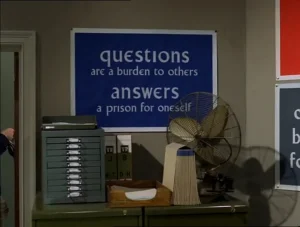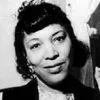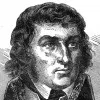Questions are a burden to others
Answers a prison for oneselfGeorge Markstein (1926-1987) British journalist, author, screenwriter
The Prisoner, 01×01 “Arrival” (1967-09-29) [with David Tomblin]
(Source)
Sign in the Labour Exchange office of the Village.
Quotations about:
questions
Note not all quotations have been tagged, so Search may find additional quotes on this topic.
“So far,” said I, “is this from filling me,
I famish more than if I’d held my tongue,
And in my mind pile up perplexity.”[“Io son d’esser contento più digiuno”,
diss’io, “che se mi fosse pria taciuto,
e più di dubbio ne la mente aduno.”]Dante Alighieri (1265-1321) Italian poet
The Divine Comedy [Divina Commedia], Book 2 “Purgatorio,” Canto 15, l. 58ff (15.58-60) (1314) [tr. Sayers (1955)]
(Source)
Dante complaining about the quality of some of Virgil's answers.
(Source (Italian)). Alternate translations:"Oft, as I drink of that celestial rill,"
I cry'd, "I find my thirst increasing still;
Its copious draughts but more inflame my soul
In search of heav'nly truth."
[tr. Boyd (1802), st. 13]“Now lack I satisfaction more,” said I,
“Than if thou hadst been silent at the first,
And doubt more gathers on my lab’ring thought."
[tr. Cary (1814)]"Less satisfied am I than what I was,"
I said, "than if I still had held my peace;
And in my mind still more the doubts increase."
[tr. Bannerman (1850)]"I am more hungering to be satisfied,"
I said, "than if I had before been silent,
And more of doubt within my mind I gather."
[tr. Longfellow (1867)]"I am more fasting from being satisfied," said I, "than if I had before held my peace, and I unite more doubt in my mind."
[tr. Butler (1885)]"Through being contented, I do hunger more
Than if thou first hadst silent been," I said,
"And in my mind I gather doubt galore."
[tr. Minchin (1885)]“I am more hungering to be contented,” said I, “than if I had at first been silent, and more of doubt I assemble in my mind.
[tr. Norton (1892)]"I am more fasting from being satisfied," said I, "than if I had kept silent at first, and more perplexity I amass in my mind."
[tr. Okey (1901)]"I am more hungry for satisfaction" I said "than if I had been silent before and my mind is more filled with perplexity."
[tr. Sinclair (1939)]"From being satisfied I fast not less
But more," said I, "than had I question spared,
And in my mind doubt doth the more increase."
[tr. Binyon (1943)]"I am left hungier being thus fed,
and my mind is more in doubt being thus answered,
than if I had not asked at all," I said.
[tr. Ciardi (1961)]"I am more hungering to be satisfied," I said, "than if I had at first been silent, and more of doubt do I assemble in my mind."
[tr. Singleton (1973)]"I hunger more for satisfaction now,”
I said, “than when I held my tongue before,
and new perplexities come to my mind."
[tr. Musa (1981)]"I am the more starved of satisfaction,"
I said, "than if I had said nothing just now,
And more doubt collects in my mind."
[tr. Sisson (1981)]“I am more hungry now for satisfaction"
I said, "than if I'd held my tongue before;
I host a deeper doubt within my mind."
[tr. Mandelbaum (1982)]“I am hungrier to be contented,” I said, “than if you had been silent earlier, and I am gathering more doubt in my mind."
[tr. Durling (2003)]I said: "I am hungrier by being fed than if I had kept silent from the start, and I have added more confusion to my mind."
[tr. Kline (2002)]"I hunger more for satisfaction now
than if," I said, "you'd not said anything.
I gather in my mind still greater doubt."
[tr. Kirkpatrick (2007)]"I am more starved for answers," I said,
"'than if before I had kept silent,
since now my mind is filled with greater doubt."
[tr. Hollander/Hollander (2007)]"My hunger for knowledge is now less satisfied,"
I said, "than if I had never asked the question,
And the more doubt collects in my troubled mind."
[tr. Raffel (2010)]
A work of art does not answer questions: it provokes them; and its essential meaning is in the tension between their contradictory answers.
Leonard Bernstein (1918-1990) American conductor, composer, author, music lecturer, pianist
“A Sabbatical Report,” sec. 1, New York Times (24 Oct 1965)
(Source)
Reprinted in The Infinite Variety of Music (1966)
There are years that ask questions and years that answer.
Zora Neale Hurston (1891-1960) American writer, folklorist, anthropologist
Their Eyes Were Watching God, ch. 3 (1937)
(Source)
Albert grunted. “Do you know what happens to lads who ask too many questions?”
Mort thought for a moment. “No,” he said eventually, “what?”
There was silence.
Then Albert straightened up and said, “Damned if I know. Probably they get answers, and serve ’em right.”
Questions show the mind’s range, and answers, its subtlety.
[Les questions montrent l’étendue de l’esprit, et les réponses sa finesse.]Joseph Joubert (1754-1824) French moralist, philosopher, essayist, poet
Pensées [Thoughts], ch. 4 “De la Nature des Esprits [On the Nature of Minds],” ¶ 62 (1850 ed.) [tr. Lyttelton (1899), ch. 3, ¶ 21]
(Source)
(Source (French))
While confirmed as an entry in the French, I was unable to find translations other than Lyttelton's in my various sources.









